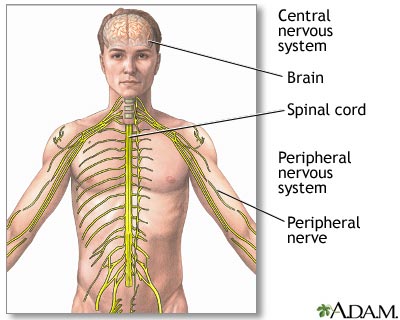Treatment
There is no known cure for ALS. The first drug treatment for the disease is a medicine called riluzole. Riluzole may prolong life, but does not reverse or stop the disease from getting worse.
The goal of treatment is to control symptoms. Baclofen or diazepam may be used to control spasticity that interferes with activities of daily living. Trihexyphenidyl or amitriptyline may be prescribed for people with problems swallowing their own saliva.
Physical therapy, rehabilitation, use of braces or a wheelchair, or other orthopedic measures may be needed to maximize muscle function and general health.
Choking is common. Patients may decide to have a tube placed into their stomach for feeding. This is called a gastrostomy.
A nutritionist is very important to help prevent weight loss. The illness itself appears to increase the need for food and there is usually limited ability to swallow.
The use of devices to assist in breathing includes machines that are only used at night as well as constant mechanical ventilation. Patients should discuss their wishes regarding artificial ventilation with their families and doctors.

Support Groups
Emotional support is vital in coping with the disorder, because mental functioning is not affected. Groups such as the ALS Association may be available to assist in coping with the disorder.
See: ALS – support group
Prognosis (Expectations)
There is progressive loss of ability to function or care for oneself. Death often occurs within 3 to 5 years of diagnosis, about 20% of patients survive more than 5 years after diagnosis.
Complications
* Inhaling food or fluid
* Loss of ability to care for self
* Lung failure (See: Adult respiratory distress syndrome)
* Pneumonia
* Pressure sores
* Weight loss
Calling Your Health Care Provider
Call your health care provider if symptoms suggest ALS, particularly if there is a family history of the disorder.
Call your health care provider if ALS has been diagnosed and symptoms worsen or new symptoms develop. Increased difficulty swallowing, difficulty breathing, and episodes of apnea are symptoms that require immediate attention.
Amyotrophic lateral sclerosis: Overview, Causes
Amyotrophic lateral sclerosis: Symptoms & Signs, Diagnosis & Tests
Amyotrophic lateral sclerosis: Treatment
Reviewed By : Daniel B. Hoch, PhD, MD, Assistant Professor of Neurology, Harvard Medical School, Department of Neurology, Massachusetts General Hospital. Also reviewed by David Zieve, MD, MHA, Medical Director, A.D.A.M., Inc.
